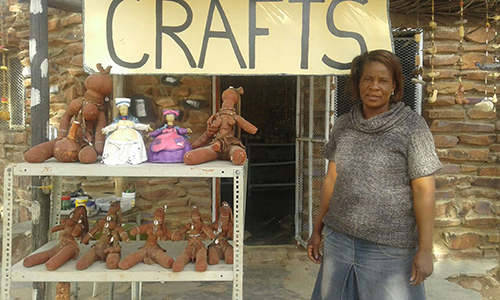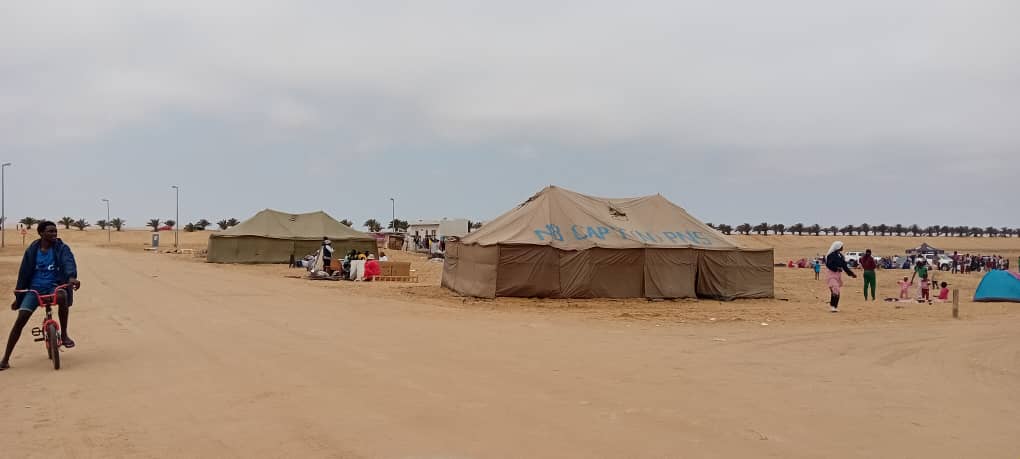A STAGGERING 70% of employable residents in the Kunene town of Khorixas are without work.
This damning revelation was made by the acting chief executive officer of the town council and manager of corporate affairs, Eben Xoagub, last week. “It is very nasty. People live in severe, severe, severe poverty.” Many people earn between N$300 and N$500 per month through cleaning other people’s yards.
The tender for the cleaning of the town is also awarded at six-month intervals to residents of the informal settlements.
At the heart of the economy of the town of about 5 000 residents, are government institutions. “Government institutions drive the economy. Most people work for the government.”
These include the town council, various ministries, school hostels and the government garage.
The second active contributor to the dusty town’s economy is the private sector, through agriculture and tourism, he says. “It’s mainly livestock farmers who own property.”
There is not a high emphasis on retail enterprises in the town.
One big retail chain shop is the only supermarket, with four other small ones scattered over the place.
Pep Stores is the only clothing line available to residents. In an attempt to market the town to the rest of the country, an investors’ conference is in the pipeline for August or September, Xoagub said. “We want large stores and want to give small and medium enterprises a boost. From council’s side, we would like to make the environment conducive.”
The only development that currently takes place is done on a “bit by bit” basis, he said. “It happens as we get funds.”
Before the mass housing project was recently halted, 41 houses were completed, while 18 are almost complete. Also, a new extension of land has been serviced – it too is earmarked for housing development.
Xoagub says plans are underway to start building a mall for the town in September.
While The Namibian was visiting the town last week a stream of sewage water in the so-called location could be seen flowing into the road. A significant stench could be observed.
Residents complained that it has been going on for three weeks without the town council doing anything to clean up the smelly waste water.
According to Xoagub, the problem was rectified late on Thursday. He said residents block their own drains by dumping household rubbish into the drains. “People do it on purpose.”
Also, thieves use drains as storage space for their loot, he said. The acting chief executive officer denied that it had taken three weeks to deal with the problem. About a huge rubbish dump right outside the town council offices, Xoagub said although they have strategic places designated for rubbish dumping, some residents prefer to dispose of their trash right outside the town council offices.
Due to rampant poverty at the town, some women and men also resort to “silent prostitution”, Xoagub says.
The town is characterised by entrepreneurs – young and old – who earn an income through innovative ways. Sixty-seven-year-old Anna Ida Jimmy-Naruses runs Ida’s Take Away in the centre of town.
She started operating last year after being retrenched as a long-time Women’s Action for Development (WAD) employee.
According to her, she’s always had an entrepreneurial spirit. She sells pap and soup for a mere N$10. “People were really interested. I offer a friendly service and a place that is clean and they can sit down too.”
Subsequently, she has also started selling braaied meat. “I give my customers attention and place a high premium on good service. One should not have very high prices and also be friendly towards your customers.”
Although she feels tired at times and suffers from back pain, she does not give up. “Once I’ve rested for the night, I get some strength to carry on. It’s tough, but we carry on.”
Willem Gariseb (49) introduced the first-ever taxi service in the town. “I saw the number of people in the town was increasing and the distances between places also increased. Also, I was unemployed, but had a vehicle.”
On a good day, he transports between 30 and 40 people around town for a fee of N$10 per person per ride. “Some people need to go to hospital at night and need transport.”
His job gives him immense pleasure, he says. “I really enjoy it and I was the first one.”
A few others have followed suit in the meantime. “About ten or fifteen of them.”
Her main target market is tourists. However, she admits, months go by without her making a penny. Nonetheless, she enjoys what she does. “I enjoy working with the tourists.”
A young male part-time sex worker in his twenties says that one is often remunerated by one’s clients in the form of drinks and cigarettes.
Stay informed with The Namibian – your source for credible journalism. Get in-depth reporting and opinions for
only N$85 a month. Invest in journalism, invest in democracy –
Subscribe Now!










